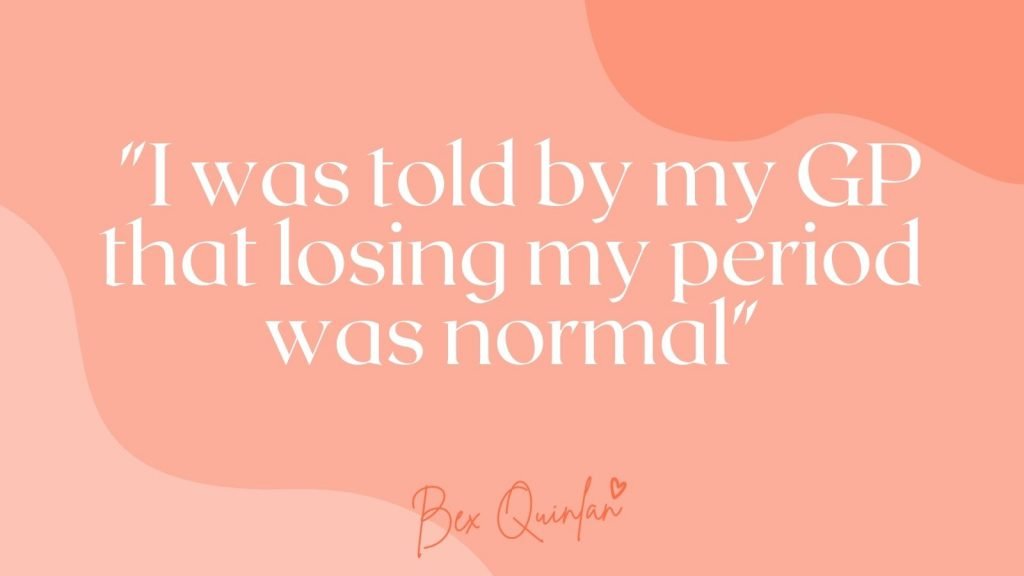When I was 14 years old I went to the doctors. I started my periods when I was 13. By the time I turned 14, they had stopped. So after about six months of not having had a period, my mum insisted that I go to see the doctor. My mum and I sat down in front of the doctor and explained what was happening with my periods. I was a competitive athlete and spent a lot of time training and competing and explained this to the doctor. My mum explained how she was concerned that my periods had stopped. She wanted to know what it might be caused by, and what we should do about it.
The doctor responded by telling my mum and I that because of the amount and intensity of training I was doing for my athletics, it was perfectly normal not to have a period. She then went on to tell me that there are many elite, professional athletes who would not have periods and so it was nothing for me to worry about. This was probably a doctor who had received the standard less than two hours training on eating disorders at medical school.
Losing your period is one of the key signs of having an eating disorder. At the time of going to the GP, I had been trying to lose weight. I thought I was too fat and had started hiding and throwing away food. I was becoming very preoccupied with calories, weight and exercise. Although I didn’t know it at the time, I was developing an eating disorder. But when I went to the GP with my loss of periods, a sign of an eating disorder, this was not picked up on. I was instead told it was perfectly normal to be an athlete without periods.
It was my dream to become a professional athlete (I wrote about this in one of my old blogs Back on track). The doctor had told me that many professional athletes would not have periods. I believed that for me to become a professional athlete, I needed to be like them. For me to achieve my dream, I had to keep my period away. And as my loss of period had coincided with weight loss, this meant that I had to stop myself gaining any weight back, and try to lose more.
What followed were years of growth of an unspotted eating disorder. This then became very severe when I went away to university. My anorexia had previously never been picked up on, but now it was impossible to miss. I was removed from university and taken to an eating disorder hospital. Many of the following years were then spent as a revolving door patient.
I now deliver talks on eating disorder and my experiences with anorexia to medical students at university. Believe it or not, but the average medical school provides only two hours of education on eating disorders. Two hours across an average of a six year degree. Two hours of education on the mental illness with the highest mortality rate. This is not acceptable. The current eating disorder education at medical schools is beyond insufficient. People with eating disorders are worth more than two hours.
This is why I deliver talks on eating disorders to medical schools. To try to enhance the education and understanding of eating disorders in future doctors. Often, one of the questions that I get asked when I do these talks is “What do you think would have helped or could have been done differently?” Truthfully? What could have made a huge difference to my life is for that doctor that I went to see when I was 14 to recognise that losing a period is not normal. For that doctor to have had better education on eating disorders and been aware that losing a period is a sign of having an eating disorder.
Had my eating disorder been picked up by that doctor back then when anorexia was starting to develop in my mind, then I could have received early intervention and support. Because the thing with eating disorders are that early intervention is key for recovery. The longer an eating disorder is left untreated, the stronger it grows. So by the time I was taken out of university, my eating disorder had been growing for nearly seven years. It had become incredibly ingrained and therefore so difficult to fight against. But back when I was 14, those eating disorder thoughts I was experiencing were relatively new. They hadn’t had the chance to grow so incredibly strong. Receiving support at that time could have been the key to ensuring a speedy full recovery, rather than the years of suffering that followed.
The eating disorder charity are running a campaign to increase education of eating disorders at medical school. This is also the theme for this years eating disorders awareness week. I continue to try and do my bit by delivering sessions on eating disorders to doctors and other medical professionals. Because two hours is not enough. People with eating disorders are worth more than two hours.
You can sign Beats campaign here: https://www.beateatingdisorders.org.uk/support-our-work/campaign-for-beat/current/campaign-worth-more-than-2-hours/
Twitter: https://twitter.com/LittlebexQ
Instagram: https://www.instagram.com/bex.quinlan.319/
YouTube: https://www.youtube.com/Bexsanorexiarecovery
